- Home
- Various Authors
Legends: Stories in Honor of David Gemmell Page 8
Legends: Stories in Honor of David Gemmell Read online
Page 8
After the tea was finished, Zharn put out her fire and we set off once more. “Mistress Marala, we climb for nearly a day,” said Zharn. “Don’t expect tea every hour.”
I managed a laugh. “I have travelled to many far lands, and have climbed mountains before. My legs will become accustomed to the ascent.”
Zharn smirked; she did not believe me.
Strangely, the steps were busier than I thought they’d be. We came across merchant camps at corners in the path, where there were wide verges fragrant with herbs, and space for tents to be erected and rugs to be spread out in order to display wares. We passed other travellers, again predominantly traders, descending the path. Zharn swapped produce with just about everyone we met. She was particularly taken with a charming little black goat a Meronne boy wanted to sell her, but then hardened her heart because it was too expensive.
We did have to pause our journey a lot, because no matter how hardy I’d considered myself to be, the climb punished my body. By midday I could barely breathe. Happily, Zharn wanted to linger at every camp we encountered and examine the wares arrayed on the rugs. I bought a small serpent head fashioned in soapy, dark green stone; an unbelievably ancient relic. Zharn was scornful. “Mistress, you can pick those up by the dozen in Gyth. Why pay?”
But to me it seemed part of the adventure.
By late afternoon, having made good time, (so perhaps I wasn’t as feeble as Zharn had feared), we reached The Last Inn Before the Mountains. I shall never forget the thrill of turning that final corner of the path, going beyond the last step and seeing the high, peaked roofs of the immense building rearing before us. It was surrounded by a wide veranda, crowded with chairs and tables, none of which matched. Here, guides, merchants, brigands and perhaps even slavers, sat together talking and laughing loudly, making flamboyant gestures, and clearly getting greatly drunk. The air was thick with the intoxicating perfume of incense and the fume of makh, which many of the company were smoking. Three musicians were making a racket upon strange stringed instruments I’d not seen before, comprising complicated webs of strings and delicate wooden struts. Another hammered upon a hand drum and yodelled. Altogether it was a scene of chaos. I didn’t even think of Lighurds at that moment, let alone see one.
“It’s not usually this busy,” Zharn told me. “There was a fair held at Yee-Anan, the first town beyond the Old Path. It finished today.” She grinned greedily. “They will have much to sell, and they are nearly all drunk. Why don’t you get us a room for the night? I won’t go home until tomorrow and I believe my lodgings were part of the fee.”
“Of course.”
I sidled up the crowded inn steps and between the haphazardly-placed chairs on the veranda, but no one gave me a second glance. Inside, I found myself in an immense, high-ceilinged room fashioned entirely from pale wood and again crowded with tables and chairs, most of which were occupied. The air was far muggier and hotter than on the veranda outside and the din even louder. A grill was set up in one corner, smoking voluminously, but issuing wonderful aromas of cooking spiced meat and root vegetables. Saffron rice steamed in great pans, smelling like incense. I realised how hungry I was.
Owing to the amount of guests in the establishment, I feared I’d have difficulty securing us a room, but the woman in black silk, who stood behind a high desk near the door, dealing with reservations, made no protest. I took one room with two beds to save money.
“Trading here?” the woman asked. Her long pointed fingernails were lacquered a very shiny obsidian hue. A band of black cosmetic was painted across her face, from which her eyes peered, shockingly white with inky irises.
“I’m a Historian from Tasmagore,” I said. “I’ve come to view the ruins and... whatever else is found beyond the Black Mountains.”
The woman grinned. Several of her teeth were studded with gemstones – blue and white crystal. “Need a guide, then. Or join a caravan.”
“Yes, I will attend to this in the morning.”
“Will keep my ears open for you,” said the woman. “Here’s your key. Room 38. Third floor.” The key was small and black and seemed hardly a key at all, as if it would fit any lock in the building.
Zharn had been seeing to stabling the goats, and now shouldered her way into the inn. She grabbed my arm. “Let’s go back out.”
“Food,” I said plaintively, pointing at the grill.
“There’s better outside,” Zharn insisted, “by the hot spring.”
The atmosphere was quieter round the back of the inn. A dozen roaring braziers warmed the air. Some patrons, of both genders, were sitting naked in the heated waters of a bubbling pool in the rock, lit by a multitude of tiny firefly lamps that had been hung in the trees around them. Those languishing in the waters seemed faintly drugged; they spoke in low voices and their laughter was gentle. Nearby was another grill, and here a pretty boy was also cooking. Watching his careful, graceful movements was like observing a ritual being enacted; he clearly took his job seriously.
Carrying wooden trays crowded with dishes of beautifully-scented food, Zharn and I sat down at a table beneath a tree blazing with red and blue points of light. The subtle radiance dyed the girl’s skin; she looked half supernatural. She smiled at me, uttered “welcome to the door step of Kyla,” and then spooned a vast quantity of pale yellow rice into her mouth.
“It’s wonderful,” I said, gazing beyond her.
Ahead of us, to the north, against the star-sequinned sky, reared the mountain barrier that shut Kyla off from the rest of the country, but for the tunnel that pierced it. The Black Mountains were unthinkably old, the realm of gods long lost to human imagination, but not perhaps to the minds of Lighurds.
“I need to find a guide,” I said.
Zharn nodded. “One will find you, don’t worry. The inn hostess will have passed the word about you. Already they will be debating which one of them will slim your purse.”
“Tell me of Lighurds,” I said. “I didn’t notice any here. I’d like a Lighurd guide.”
Zharn wiped a long grain of rice from the corner of her mouth. “You foreigners are obsessed with them.”
“Well, we’ve nothing like them at home. Tell me now, are they fierce, cruel, mindless, what?”
“They are men in serpent skins,” said Zharn, “to be feared no more than any other man, and yet... They are different too, owing to the age of their race. There is no older species on this Earth, or so my grandmother told me. It weighs heavily upon them sometimes.”
“What of their women? Do they look different to the males?”
Zharn nodded, took another mouthful of food and spoke through it. “If you are lucky, you might see one. They do not interact with humans greatly.”
“And yet a man told me back in the Valley they will sometimes sell their children to foreigners...”
“That is true, though rare. Just because they are old and primitive does not mean they have no desire for their young to see the world. The humans who come here are rich and offer good opportunities for the youngsters of any race or species. That much you must concede.”
“A good point,” I said, although really it didn’t ring true with me. The explanation was too mundane.
“But then,” Zharn continued, suddenly appearing wistful, “I’ve heard there are people who can’t bear the company of Lighurdkind in their homes, because some nights they keen for the vanished glory of their people, and the song is beautiful and terrible, capable of driving the most sensitive of listeners into the deepest melancholy. They are reminded of the futility of greatness, how glory is fleeting and nobility may be lost. Those long, scaled throats that hold no fire may burn a person with song.”
“That is beautiful, Zharn,” I said, somewhat aghast at her sudden eloquence.
She shrugged. “My grandmother says it to people.”
Later in the evening, I was approached several times by individuals claiming they would be my best guide into Kyla. All of them, to my eyes, offered the pr
omise of an intriguing journey, but I was waiting for something. You, of course, may have guessed what. He came to me as midnight drew near and a group of Roosha priests began to chant to the Goddess of Turning Days. Drunken inn patrons took up the song, as did the half dozen in the pool nearby.
“None of the cackwits here have my sense of the road,” my latest applicant, a great bear of a Sark with a huge yet silky black beard, was saying to me. “I can take you to places few travellers see.”
All of them had said that. Perhaps they did not all speak of the same places.
I nodded slowly at his words, somewhat intoxicated by the saffron-infused wine Zharn had fetched for us. “What is your price?” I asked.
“Too much,” said an extremely sibilant, whispery voice behind me. At first I could not distinguish if it issued from a male or female throat.
The guide before me laughed good-naturedly. Whoever stood at my back was a friend of his. I could smell this person: dry, musky, hot.
“It is me she wants,” they said.
The man narrowed his eyes. “And what interests you so much about her?” He glanced at me, pointing over my shoulder with a stiff finger. “I warn you. Don’t be misled. He sees some profit in this.”
I turned round, because not to do so would have seemed odd by now. He towered over me; seven feet of Lighurd. His emerald and black striped quills were very long and reached to his waist, many decorated with silver rings. On either side of his nostril slits, delicate tendrils drooped, rather like the whiskers of a cat fish. He spoke like a man, yet was not a man. It seemed preposterous he could speak the language of Oort, albeit in a struggling manner, because his jaw was not fashioned to utter it. He had no soft lips to form the words yet even so he spoke clearly. That always puzzled me.
“What is your price?” I asked him. Whatever it was I would afford it.
They called him Agouzi; this was not his real name. He came from a Lighurd settlement this side of the mountains; trader people, naturally. Zharn and I sat with the guide and his Lighurd friend, plus a few others who ambled over to join us, until at least two in the morning. Once our business arrangement had been finalised, Agouzi said nothing more to me, but I was aware of him constantly, also aware it was a feeling very similar to being near a person to whom you are greatly attracted, yet it was not that with him.
Zharn and I rose late the following day, both of us bearing the ill-effects of drinking too much alcohol at such a high altitude, after a long day’s climb. As we ate breakfast in the vast room downstairs in the inn, I began to wish Zharn would continue the journey with me and even suggested carefully she might consider it.
“I can’t,” Zharn replied. “I have to go to the market in the Jade Hills tomorrow. Don’t worry. You’ll be quite safe. The Lighurd will look after you.”
“They are... trustworthy, then?”
“Like all the people in this place, they know where their money comes from. Only a fool would hurt a traveller; they are walking purses, every one.”
“So not even robbery?”
“A robbed person doesn’t recommend a place to their friends,” Zharn said. “Even less so if they are dead.”
“I will bring you something back,” I said. “From the ruins. You have been good to me, Zharn. I appreciate it.”
Zharn shrugged. “We will hold a party on your return.” She stood up. “Ah, here is your guide. Travel well, friend Marala.” She bowed to me and departed.
And there stood Agouzi, regarding me inscrutably. His long black tongue slid out and licked the air.
“Would you take tea before we set off?” I asked, gesturing at the cups and pot on my table.
He shook his head, making his quills rattle. “We should begin,” he said, “or we will miss the next raft to Yee-Anan.”
I had already settled my account with the inn, so I only had to pick up my travel-bag to be ready. Zharn had instructed me not to buy pack goats before Yee-Anan, since it would be cheaper there; I intended to return with them laden.
Two dozen people crowded onto the raft that would carry us through the rock. A girl lit torches at each corner of the vessel even before we entered the dark. I sat next to Agouzi on a bench, pressed against him owing to the crowd. His body felt unnaturally hot. He seemed barely aware of me and did not speak. I found it hard to believe he was there beside me, like a myth come to life. I wondered what thoughts he had, or how he thought.
The tunnel beneath the mountains took two hours to traverse. There was quite a jolly atmosphere aboard the raft as the pilot’s assistant, who had lit the torches, dispensed refreshments and then began to regale her water-bound audience with various recitals and songs. Lulled back into a half-doze by her lilting voice, I gazed dreamily at the tunnel walls; black rock occasionally starred with crystal veins.
When we emerged at Yee-Anan, and the pilot swung the raft up against the wide but sagging jetty, Agouzi politely suggested we might hire our goats and then continue our journey immediately. Perhaps he sensed I would be seduced by all the merchant stalls scattered about the town, which was really little more than a village. The buildings were old and low, sway-backed like geriatric horses. I pressed paper money into Agouzi’s hot, clawed hands. “Buy us goats,” I said, “and anything else we might need.”
He bowed his head and loped off, switching his long tail in a manner that to me suggested faint irritation. But perhaps Lighurds don’t express themselves with their tails in the same way cats do.
While I waited, I sat upon a tree stump near the jetty and shrouded my eyes with one hand to look around. The thin air sparkled with clarity and the smudge of a few clouds was high, high above me. I felt chilly, but not cold. The sun blazed without impediment. Beyond the flag-hung northern gateway to the town, I glimpsed a spreading vista of hilly plains, covered in gold and green lichens or grasses. Immense carrion birds sailed upon the air currents, uttering mournful cries.
Presently, Agouzi returned leading two black goats, each hung with four capacious panniers. Two of these baskets appeared to be full of supplies and camping equipment. I didn’t expect any change from my money and didn’t receive any. It was of no consequence.
“If the goats aren’t enough, you may hire an Egni carrier later,” Agouzi said. “The people of Kyla are used to transporting heavy loads.”
“That depends on how successful my foraging is,” I said, in what I wincingly realised was rather a flirtatious tone. “I hope you will guide me to places of wonder where I may plunder the past fantastically.”
I realised then that when you are faced with a being who cannot physically smile or frown, lacking the fleshy facial tissue to do so, it is difficult to judge reactions and moods. Agouzi just stared at me. Perhaps he didn’t have a sense of humour. I got to my feet. “Well, lead on!”
A rutted road led north, with thin straw-like grass growing like a stiff mane along its centre. People riding goats, slightly larger than our pack animals, trotted past us, waving hello. I wondered whether riding-goats might also have been a luxury I could have afforded. The natives of the area seemed to comprise mainly a short-statured, dark-skinned race, whose faces were almost invisible owing to the large hats, helmets and complicated veils and turbans they favoured. I had yet seen no Lighurds other than Agouzi.
“Where are your people?” I asked him as we walked, each on one side of the centre tuft of the road. “I thought Kyla was your land, yet all I see are these quaint little people, who are indisputably human.” I smiled at him.
Agouzi cast me a sidelong glance. “It is the time of year,” he said, as if that meant anything to me.
“I see... religious festivals, something like that?”
“Something like that,” he replied. “Once we leave the main road, you might see more of my kind. We might need to buy supplies from them, in between the Egni settlements.”
“Egni being the... little people.”
“Yes.”
“People never speak of them when discussing Kyla; it
is always Lighurds who are the topic of conversation.”
“And you know little of either of our races,” Agouzi observed, but not in a sharp tone.
“I’m surprised more people don’t come here,” I said. “It’s so beautiful, so... unspoilt.”
“They will stop altogether when the plunder is finished and everything is gone,” Agouzi said.
“It’s important to preserve the past.” I was aware I sounded too defensive. “We learn much from it that helps us understand how we are now.”
“This land is not your past,” Agouzi said, without inflection.
I fell silent after that, sensing whatever I said would provoke similar answers that would, from any other mouth, sound sour and criticising. From Agouzi’s mouth, it was difficult to divine his thoughts on the matter.
Conversation discouraged between us by my companion, we travelled on for the rest of the day in near silence. Occasionally, Agouzi would direct my attention to particular landmarks and tell me something of their history. Always ruins – sometimes just humps on the ground covered in lichen. My spirits fell, despite the clear, heady air; this land felt like the graveyard of all the species of the world. I felt too listless to reply to Agouzi’s remarks or question him for further details.
We paused once to refresh ourselves at midday, but after building a small fire and preparing us tea and hot spiced rice, Agouzi wandered off by himself. He took his bowl of rice to a clump of rocks some distance away and there squatted to consume his meal, his back to me.
At sunfall, we came upon an Egni settlement and Agouzi suggested I take a room with one of the local families. This I did, and was somewhat revived by the cheerful tribe who offered me accommodation almost as soon as we stepped beyond the gate of their village. These people spoke a dialect I could barely comprehend, but they seemed happy simply to talk at me, and did not appear to expect responses. Chattering, they dragged me to their home and offered me vast amounts to eat and drink. I was very tired, and after eating collapsed upon the mattress in the attic to which they directed me and fell into the deepest of slumbers. Where Agouzi slept I had no idea.

 Lady Ambleforth's Afternoon Adventure by Ann Lethbridge, Barbara Monajem, Annie Burrows, Elaine Golden, Julia Justiss and Louise Allen
Lady Ambleforth's Afternoon Adventure by Ann Lethbridge, Barbara Monajem, Annie Burrows, Elaine Golden, Julia Justiss and Louise Allen Gods & Mortals
Gods & Mortals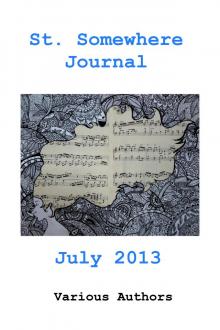 St. Somewhere Journal, July 2013
St. Somewhere Journal, July 2013 firstwriter.com First Short Story Anthology
firstwriter.com First Short Story Anthology Warcry: The Anthology
Warcry: The Anthology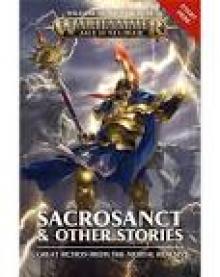 Sacrosanct & Other Stories
Sacrosanct & Other Stories Ultimate Heroes Collection
Ultimate Heroes Collection Cthulhu Deep Down Under Volume 2
Cthulhu Deep Down Under Volume 2 Erotic Classics II
Erotic Classics II Dynasties: The Elliotts, Books 1-6
Dynasties: The Elliotts, Books 1-6 Dynasties:The Elliots, Books 7-12
Dynasties:The Elliots, Books 7-12 International Speculative Fiction #4
International Speculative Fiction #4 Fyreslayers
Fyreslayers One Night In Collection
One Night In Collection Mortal Crimes 2
Mortal Crimes 2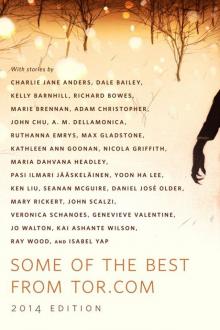 Some of the Best from Tor.com
Some of the Best from Tor.com Howl & Growl: A Paranormal Romance Boxed Set
Howl & Growl: A Paranormal Romance Boxed Set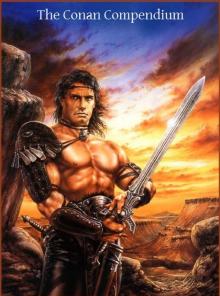 The Conan Compendium
The Conan Compendium The Malfeasance Occasional
The Malfeasance Occasional Brides of Penhally Bay - Vol 4
Brides of Penhally Bay - Vol 4 Brides of Penhally Bay - Vol 2
Brides of Penhally Bay - Vol 2 Brides of Penhally Bay - Vol 1
Brides of Penhally Bay - Vol 1 School's in Session
School's in Session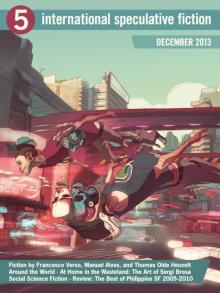 International Speculative Fiction #5
International Speculative Fiction #5 Erotic Classics I
Erotic Classics I Legends: Stories in Honor of David Gemmell
Legends: Stories in Honor of David Gemmell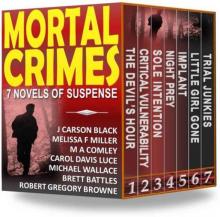 Mortal Crimes 1
Mortal Crimes 1 The Classic Children's Literature Collection: 39 Classic Novels
The Classic Children's Literature Collection: 39 Classic Novels Don't Read in the Closet volume one
Don't Read in the Closet volume one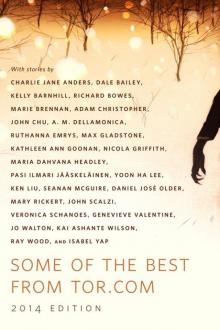 Some of the Best from Tor.com: 2014: A Tor.Com Original
Some of the Best from Tor.com: 2014: A Tor.Com Original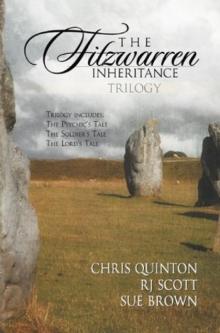 The Fitzwarren Inheritance
The Fitzwarren Inheritance All Things Zombie: Chronology of the Apocalypse
All Things Zombie: Chronology of the Apocalypse Hammer and Bolter - Issue 12
Hammer and Bolter - Issue 12 Kiss Kiss
Kiss Kiss Dog Stories
Dog Stories Bad Blood Collection
Bad Blood Collection